A CEE-Change Fellow Expands Their Reach from Local to International
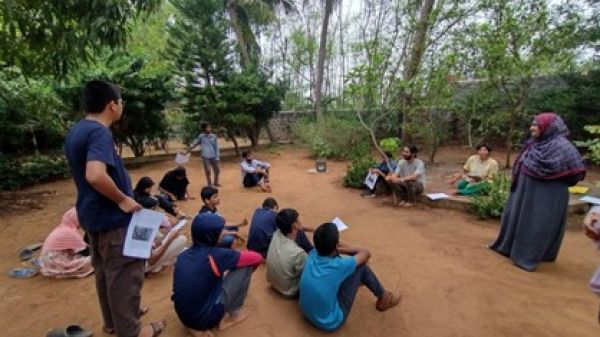
Each month, NAAEE will post narratives from the CEE-Change Fellows as they implement their community action projects and work to strengthen environmental education and civic engagement capabilities, all supporting the mission of cleaner air, land, and water. Join us on their journey! The Civics and Environmental Education (CEE) Change Fellowship is NAAEE’s newest initiative to support leadership and innovation in civics and environmental education in North America. This ee360+ program is a partnership between NAAEE, US EPA, and the Cedar Tree Foundation.
I had just finished another round of editing my students’ climate stories when I got an email notification. Tired and blurry-eyed from all the screen time, I casually clicked on the icon.
“Congratulations! You've been accepted into the 2023 Civics and Environmental Education Fellowship Program!”
To be honest, I didn’t jump, race around the room, and yell the house down. I was in deer-in-headlights mode; nothing was sinking in. Except for my knees, they were buckling as I felt myself sag against the wall. It took my niece considerable effort to give me a big hug, get me a glass of water, and prop me on a chair! Truly, the email changed my life.
I had been running the Young Climate Authors program (YCA), previously known as the Earth Author Program, for children in Chennai for some time. Participants, typically middle and high school students, learned about environmental degradation, climate change, sustainability, and resilience using place- and nature-based experiential learning, which involved field trips, meetings with activists, experiments, and collaboration. They used this learning to write and publish storybooks about environmental and climate change issues faced in Tamil Nadu. I had observed the program’s incredible impact on these youth, not only in terms of environmental and climate literacy, but also in metacognition, self-regulation, empathy, and a sense of agency and empowerment to act on issues of social justice. However, the program was limited to the few children I could reach and work with in Chennai, India. I had vague ideas of expanding the scope of the program by training environmental educators and activists in India on how to implement the book-authoring program in their communities. But, with the enormous workload of the PhD I was doing, I felt my idea would just remain an amorphous dream. That’s when the CEE-Change Fellowship came in.
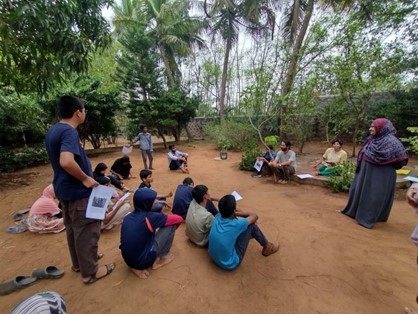 YCA Session in progress. Photo credit: Abubakr Jamal
YCA Session in progress. Photo credit: Abubakr Jamal
The CEE-Change Fellowship kicked off with a week-long leadership training at the National Conservation Training Center in gorgeous West Virginia. That training was an amazing experience. We spent the days learning about climate change, JEDI, program management, evaluation, and a host of other topics. We listened to fantastic speakers, swapped stories at mealtimes, and trekked to admire the beautiful Potomac as it wound its way lazily through the NCTC campus. Most importantly, during this short week, we forged bonds that would hold us together for the rest of our journey as CEE-Change Fellows. I headed home with a renewed commitment to expand the program so it could impact many more children. The next few months were spent creating the YCA Educator Training Program.
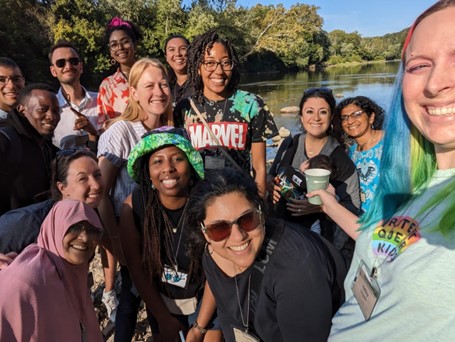 On the banks of the Potomac at the Leadership Training. Photo Credit: Ashley Young
On the banks of the Potomac at the Leadership Training. Photo Credit: Ashley Young
Young Climate Authors Program
Child-authored stories are a powerful means for children to internalize the learnings they undergo about the environment. Child-authored stories are also an important tool for communication, forging connections, engendering empathy, and building solidarity. However, children’s storytelling about the environment and climate change is a very emergent area in EE. Typically, environmental education efforts in India are what I call ‘cookie-cutter’ initiatives. These are often limited to raising awareness about the importance of the environment or its degradation. Redressal action typically consists of visiting biodiversity hotspots, planting trees, reducing plastic, hosting clean-up drives, creating organic vegetable gardens, or saving water. Children do not have opportunities to amplify their own voices in these contexts. Hence, I had an enormous challenge to convince EE organizations to evaluate and adopt the YCA program as a part of their educational outreach toolkit.
To tackle these challenges, I organized an online global book launch where NAAEE staff member Carrie Albright moderated a conversation with the 16 young authors. This was followed by an in-person book exhibition held in Chennai that was attended by members of the community, including parents, climate activists, environmental educators, and journalists. The events were covered by national and local press. Seeing the storybooks and interacting with the young authors helped convince people of the efficacy of book authoring for environmental education.
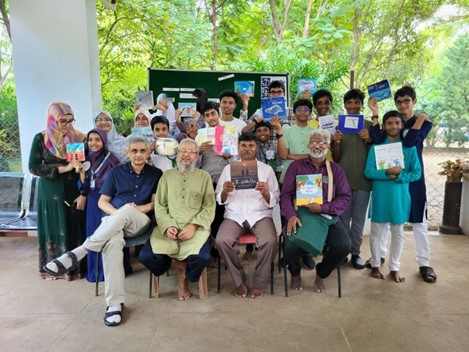
Young Climate Authors Book Exhibition in Chennai Photo Credit: P. T. Karthikeyan
Next came the challenge of recruiting participants for the educator training program. While the excitement and enthusiasm for this novel way of teaching climate change was palpable amongst the EE educators I knew, I was also aware that we EE educators are an overloaded bunch. Most of us hold down day jobs to make ends meet while working on environmental causes in our (extremely limited) spare time. How many would have the bandwidth to attend a 12-week training? Moreover, most of our EE work consists of short-term engagements with a large number of schools. YCA program, on the other hand, needs a long-term engagement with a small group of children. These doubts plagued me as I launched the YCA Educator Training collateral on social media. For reassurance and help, I relied again on the CEE-Change Fellows network, which came through for me with a tsunami of support. They not only shared my posts, but also encouraged members of their own organizations to sign up for the program. Initially, I was hoping that we would receive 10 signups, mostly from India. To my utter surprise, we closed registrations after selecting 20 educators from 9 different countries across 3 continents and had to turn away hopefuls.
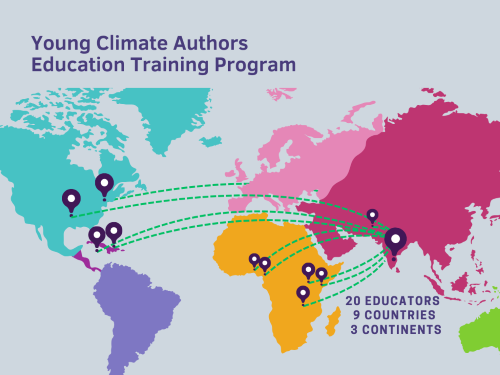
The cohort is absolutely amazing. Each person brings so much passion for the environment and such a wealth of experience. Their dynamic backgrounds include educators, environmental activists, engineers, doctors, professors, social media experts, authors, artists, and school heads. All are working towards various aspects of environmental education, social justice, and female empowerment. Check out their profiles here.
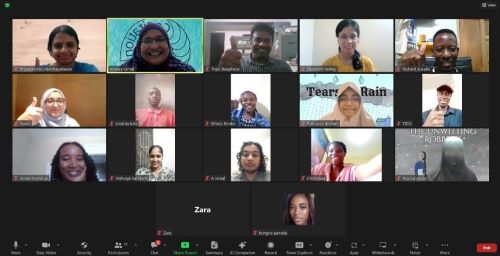
A YCA Educator Training Session Photo Credit: Aneesa Jamal
The Educator Training is organized into two parts. In the first, participants learn about climate change, climate justice, book authoring, illustration and publishing, climate action, and project planning. In the second, each participant has to complete a capstone project detailing how they would implement YCA in their communities. The cohort meets weekly for two hours. The sessions start with an interaction with a young climate author who shares their experience of book writing followed by an instructor-led session. Collaborative activities, research, and reflection form key parts of the learning experience.
As Elizabeth shared,
“As a University professor teaching language and literature courses to a largely indifferent STEM audience, this course has reinstated my belief in the necessity and power of storytelling. A story is not just a beautiful expression of human emotions but a veritable call to action, to which this course is a fitting testament!”
Similarly, Theo felt the course is equipping him to, “teach vulnerable communities how to tell their localized climate stories, to make people think, understand, and co-create an action plan to mitigate climate risk.”
As we reach the halfway point in the training, I am aware of the challenges ahead, the first being securing funding for the next stage of the program. But I am also filled with excitement at the prospect of the YCA program being implemented in a variety of contexts.
I can visualize the diverse stories that will emerge from children from so many different countries, highlighting the commonalities and celebrating their differences. Imagining these stories fills me with hope, hope for a just world where every voice makes itself heard on climate change.
For more information on this and related programs, please visit www.cogitation.in.